“The idea grew out of fear.”

“‘New Construction’ Coming Soon to Mount Royal Elementary/Middle School”
The fear was that the Chesapeake Bay Trust would decline the Mt. Royal PTO’s 2017 Watershed Assistance Grant request for $75,000 for a major de-pave/greening of the Mount Royal Elementary/Middle Schoolyard in Baltimore’s Bolton Hill neighborhood. (More on that later.)
At risk was the momentum that began building last summer with stakeholder formation meetings—community members and organizations, institutions and other non-profits, parents, teachers and school principal—for big schoolyard changes.
One Saturday last October, my wife and I, Bolton Hill residents and Memorial Episcopal Church parishioners, visited with friends the beautiful Ladew Topiary Gardens in Monkton, MD.
Inspired by the visit, and especially the Butterfly House, I put in a call for Ladew’s outreach coordinator—if and whoever that might be. Happily, Rachelle Rogers called back.
Rachelle told me that Ladew had partnered with a Harford County Title One School in a pilot outreach program in 2016 that introduced native pollinator plants to its school entrance area and provides education for students about the plants’ and pollinators’ roles in a healthy biosphere. She told me Ladew would consider Mount Royal Elementary/Middle School as its second Title One School partner.

I immediately called Kimberly Canale, Mt. Royal PTO President, so we could begin fleshing out a pollinator micro-habitat and garden classroom on the schoolyard–with big help from talented Mahan Rykiel landscape architect JoAnn Trach Tongson.
In a meeting several weeks later with school Principal Job Grotsky and others, Rachelle spoke for Ladew’s President in formally offering to teach several classes this winter about pollinators and the Chesapeake Bay Watershed to Mount Royal’s 2nd grade classes. Included is an all-expenses paid visit by the entire 2nd grade of more than 60 students to the Ladew estate this fall when the pollinators are most aflutter.
In late November a MICA professor who led an architectural ceramics tour of historic Bolton Hill building stock last summer agreed to meet with Kimberly and me to discuss our request that he guide some Mount Royal 2nd graders in designing and making ceramic stepping stones for the garden. At that meeting, he told us of how much he enjoyed observing and interacting with nature on his grandfather’s farm during his growing up years in Canada. Yes, he, and his students, would be willing to shepherd such a project for Mount Royal students.
Now a financial partner has at long last come into view. Under its Environmental Education Mini-Grant program, the CBT just announced its award of $5,000 (the maximum amount) to the Mt. Royal PTO project. Another grant request of $5,000 from a different funder to defray remaining project costs will be known in May.
Before the CBT grant award notice was received, two actions were taken 2-3 weeks ago. First was the “Sheet Mulching Event” to suppress the regrowth of the grass monoculture at the site. (High winds that morning frustrated us some, but we prevailed.)

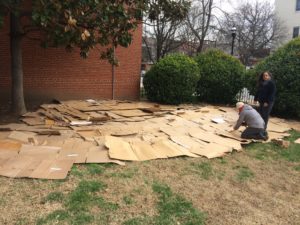
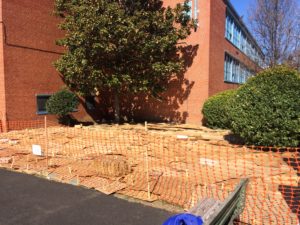
A week later the site prep was completed by adding a 3″ layer of tanbark mulch as the permanent garden surface. Accessibility will be addressed once additional funding has been obtained.
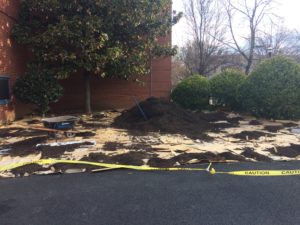
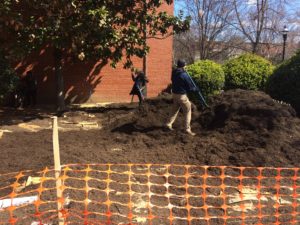
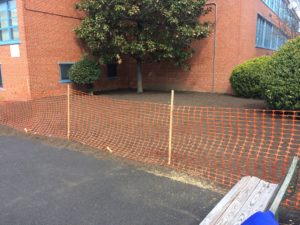 Construction of the pollinator micro-habitat/garden classroom will begin in the next couple of weeks when Middle School art students start painting a design of their choosing onto the nearly 130 pickets of a fence to be constructed on Saturdays in May, plus a Little Library, also to be installed in the garden with pollinator plants, shrubs and sub-canopy trees.
Construction of the pollinator micro-habitat/garden classroom will begin in the next couple of weeks when Middle School art students start painting a design of their choosing onto the nearly 130 pickets of a fence to be constructed on Saturdays in May, plus a Little Library, also to be installed in the garden with pollinator plants, shrubs and sub-canopy trees.
Work with the 2nd-graders in designing and kiln-firing the ceramic stepping stones is on-going.
The educational objectives for Mount Royal students are geared to STEM learning about the support offered by a new micro-habitat for pollinators and other wildlife in watershed restoration; and a healthier cityscape.
The partners of this Mt. Royal PTO pollinator/garden classroom project who have helped allay our fears are: Ladew Topiary Gardens; Mahan Rykiel Landscape Architects; MICA; the Creation Care Team of Memorial Episcopal Church; the Chesapeake Bay Trust which sells Bay plates to fund its grants programs; and, DW-GREEN Associates.
The CBT WAG request was declined, but one of its grant administrators encouraged us to apply again this September after re-tuning the application to better suit the review style of the judges.